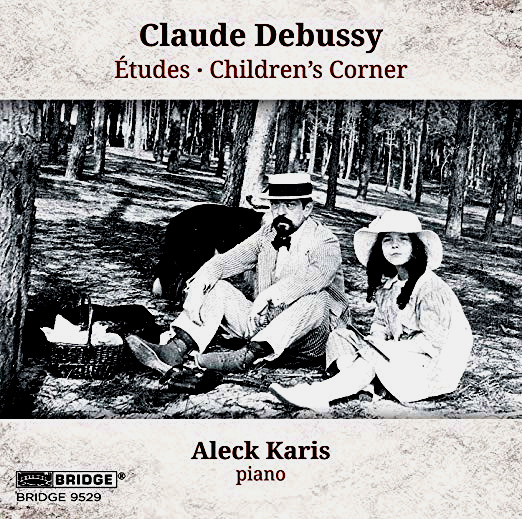
ESSENTIAL RECORDINGS

The Grove Music Dictionary defines Étude as follows: "The French equivalent of 'Study', widely adopted for fairly short pieces whose principal aim is the development or exploitation of a particular aspect of performing technique." And as every pianist knows, these studies or "exercises" were instigated by Carl Czerny as a method to reinforce a musician's technique through all forms of repetitive technical workouts for the fingers including scales in all keys, arpeggios, octaves, thirds and fifths, various rhythms, etc .... All dull and pedantic pieces that eventually drove the students, teachers, and especially the parents of budding pianists crazy. But eventually great composers like Liszt, Godowsky, Chopin and Scriabin came along which expanded the role of the "Étude" and enhanced it by permeating it with drama, poetry, and unbelievable vituosity. In 1915, Claude Debussy (1862-1918), edited the complete piano works of Chopin and felt compelled to write his own set of 12 Études exploring various aspects of piano technique. But instead of being dramatic and virtuosic workhorses that bring most pianists to their knees, Debussy's pieces are tender, volatile, poetic and even somewhat humorous, in which harmonic subtleties abound.
For example the one titled pour les "cing doigts": d'après Monsieur Czerny starts off sounding like a child going over scales who eventually gets bored and begins doodling all sorts of nonsense on the keyboard. Debussy transforms this doodling into expansive flights of the imagination, marked by his own distinctive style, which explore the myriad harmonic and rhythmic possibilities of the instrument. I admire the way pianist Aleck Karis seamlessly joins the juvenile frivolity with the complex maturity present in the work. And within all 12 Études, how he clearly extricates the essence of Debussy apart from the technical demands of each one. Over the years it seems that the recording by Mitsuko Uchida on Philips has always been the go to version for these pieces, and even considered by some to be one of the best Debussy piano records in the catalogue, as well as an excellent audio recording. Personally I find her interpretations to be overly fanciful, affected and self-aware, combined with post-production audio effects like too much reverb, which make the whole thing sound unnatural (sort of like altering an image with Photoshop). The expressive touches brought to this music by Aleck Karis are much more grounded in technical reality, and the sound of the piano itself is more accurately present and natural. The whimsical innocence found all over the pages of the Children's Corner Suite, which Debussy composed in 1905 and dedicated to his daughter, is also very well captured and expressed by Aleck Karis.
There are only about 25 recordings of the Debussy Études compared to around 400 of his ubiquitous Clair de Lune. Although that's an unfair comparison because nothing in music is quite as evocative, or used out of context so often, as is that famous piece. So it's great to see the release of a new recording of one of Debussy's last piano works, especially when it's this good.
Jean-Yves Duperron - December 2019